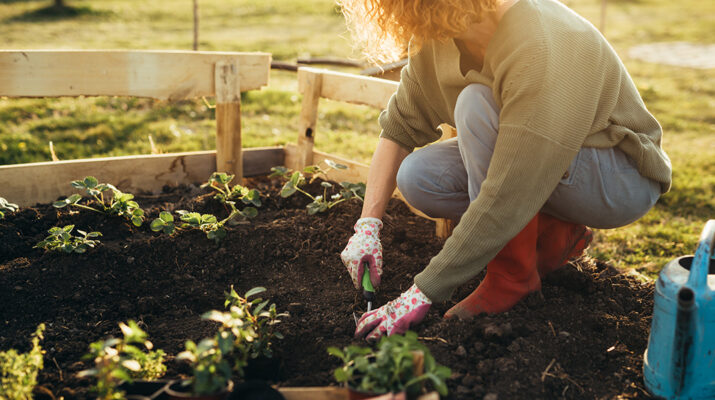Unveiling the therapeutic potential of soil: Elevating serotonin levels — and mood
By Sara Gleasman-DeSimone, guest columnist
As the blossoms of spring are here and represent the renewal of life, there’s a natural remedy waiting to be unearthed beneath your feet and that is dirt!
In an era dominated by urban landscapes and sanitized living, going back to our old friend the soil has therapeutic benefits, particularly the presence of Mycobacterium vaccae.
This is a nonpathogenic bacterium that has been gaining recognition. Exposing yourself to certain soil microbes can profoundly influence mood and well-being. So, as this season turns, let’s explore the rejuvenating effects of getting our hands dirty and embrace the soil.
The Serotonin Connection
Central to this discovery is serotonin, often referred to as the happy hormone for its role in regulating mood and emotional balance. Certainly, we can all use a dose of this at times. Studies illuminate the link between Mycobacterium vaccae, a common soil bacterium and serotonin production in the brain. Exposure to this microbe prompts the immune system to release cytokines, which, in turn, stimulate serotonin production and anti-inflammatory effects. This serotonin surge contributes to an overall sense of well-being and can mitigate feelings of stress and anxiety.
How it works
When we engage with soil, whether through gardening, hiking or simply embracing nature, we invite a microbial orchestra into our lives. Mycobacterium vaccae, among the many microbial players in soil, initiates a symphony of biological responses within our bodies. Upon exposure, our immune system springs into action, releasing cytokines to combat potential threats. Remarkably, these cytokines also act as messengers, signaling the brain to increase serotonin production. Thus, the simple act of getting dirty can trigger a cascade of biochemical events that uplift mood and promote mental health.
The science behind the smiles
Pioneering research led by Christopher Lowry, Ph. D., and his team at the University of Colorado Boulder, has unraveled the antidepressant properties of Mycobacterium vaccae. In a study, mice injected with Mycobacterium vaccae exhibited elevated serotonin levels and demonstrated reduced signs of anxiety compared to their control groups. These findings not only highlight the potential therapeutic benefits of soil microbes but also underscore the profound connection between nature and mental well-being. Building upon his work with Mycobacterium vaccae, Lowry has continued to explore the therapeutic potential of soil microbes in promoting mental well-being. In a notable study published in 2020, Lowry and his team investigated the antidepressant effects of Lactobacillus reuteri in post-traumatic stress disorder symptoms another probiotic organism found in soil. This study further underscored the profound connection between exposure to soil microbes and mental health, offering promising avenues for future research and therapeutic interventions.
Embracing nature therapy
Nature therapy, often called green therapy, advocates for the healing power of nature in promoting holistic well-being. Amidst the hustle and bustle of modern life, reconnecting with the natural world can offer solace and rejuvenation. Whether it’s cultivating a garden, embarking on wilderness adventures or simply basking in the serenity of a park to incorporate outdoor activities into a regular routine can nurture both body and soul.
Conclusion
Let’s not overlook the treasures concealed within the earth beneath us. Mycobacterium vaccae, a humble inhabitant of soil, offers a potent elixir for enhancing mood and fostering well-being. By embracing outdoor activities that bring us into contact with soil, we can harness the serotonin-boosting effects of this remarkable bacterium. So, as the seasons change this spring and nature awakens, let’s heed the invitation to play in the dirt and rediscover the joy of connecting with the earth!
 Sara L. Gleasman-DeSimone, PhD, is an assistant professor at Le Moyne College, where she serves as director of graduate nursing.
Sara L. Gleasman-DeSimone, PhD, is an assistant professor at Le Moyne College, where she serves as director of graduate nursing.

